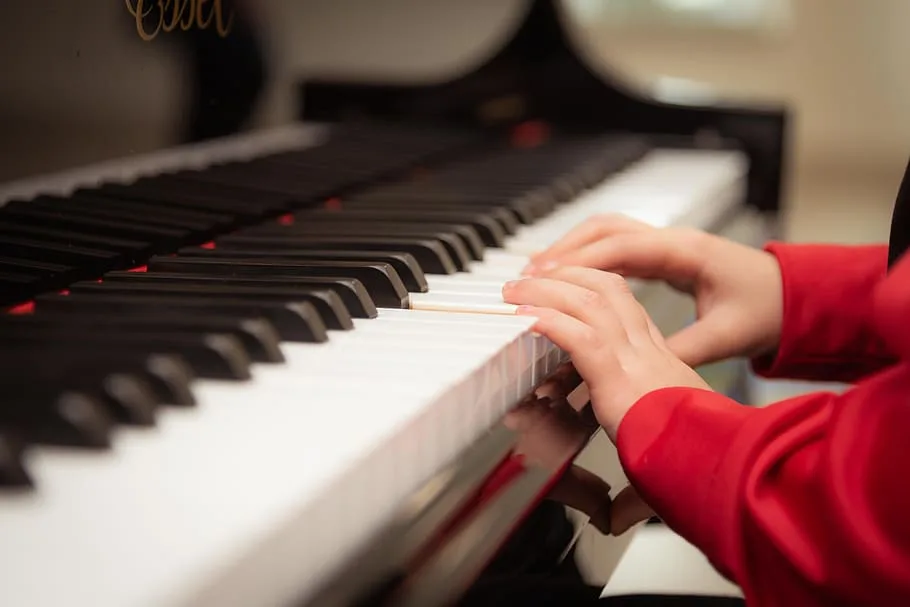When I first started learning piano, I was filled with excitement and determination. But as the weeks went by, my fingers still fumbled over the keys and my songs sounded nothing like the smooth melodies I dreamt of playing. It’s no wonder why many people give up on learning piano, thinking that it will never get easier with practice.
But as someone who has been studying and researching piano for years, I can tell you that there is a secret to mastering this beautiful instrument. And today, dear reader, I’m excited to share it with you.
In this article, we’ll delve into the question that plagues many aspiring pianists- does piano get easier with practice? We’ll explore the science behind muscle memory and how your brain adapts to new skills. We’ll also touch on common pain points when learning piano and ways to overcome them.
So if you’re ready to unlock the mystery of mastering piano and take your skills to new heights, keep reading! This article is for anyone who wants to learn how to play piano or improve their current abilities. Let’s dive in!
So, Does piano get easier?
Yes, absolutely! Just like with any skill or activity, the more you practice playing the piano, the easier it becomes. The key to mastering piano is consistency and dedication in practicing regularly. It’s important to remember that learning an instrument takes time and patience, so don’t get discouraged if you don’t see immediate progress.
With consistent practice, your muscle memory will improve and your fingers will become more accustomed to moving across the keys. This makes playing smoother and more fluid over time. Additionally, as you continue to practice, you’ll also develop a better understanding of music theory and how it applies to playing the piano.
Another important factor in making piano easier with practice is finding a good teacher or online resource that can guide you through proper technique and help you set achievable goals for yourself. Having someone who can give feedback on your progress can be incredibly helpful in improving your skills.
Ultimately, mastering piano requires dedication and hard work but with consistent practice and guidance from a teacher or resource, it definitely gets easier over time. So keep practicing, stay motivated, and enjoy the journey of becoming a skilled pianist!
Understanding Muscle Memory and Its Role in Learning Piano
Learning to play the piano is like embarking on a fascinating journey where your fingers become storytellers, and muscle memory plays an incredible part in this transformation. When you first sit down at the piano, each note feels foreign under your fingertips. Your brain sends signals to your hands, telling them where to go, but it all feels a bit clumsy at first. However, with consistent practice, something magical begins to happen—your body starts remembering those movements without conscious effort. This phenomenon is called muscle memory, and it’s essentially your muscles getting smarter over time.
As you repeatedly play scales or practice a piece of music, neural pathways are strengthened in your brain through repetition. Think of these pathways as well-worn trails in a forest; the more you use them, the clearer they become. Eventually:
- Your fingers know exactly where to land even before you think about it.
- Your timing becomes impeccable.
- You can focus more on expression rather than technicalities.
This doesn’t just make playing easier; it transforms how you experience music itself.
Imagine being able to close your eyes and still hit every key perfectly—that’s muscle memory working its wonders.
In conclusion, while learning piano undoubtedly requires patience and dedication,
the development of muscle memory can turn daunting tasks into second nature actions.
This allows musicians not only greater ease but also deeper emotional engagement
with their art form.
Overcoming Common Challenges in Piano Practice
Learning to play the piano is an exciting journey, but it can be riddled with challenges along the way. One of the most common hurdles is finding time to practice consistently. Life gets busy, and carving out a dedicated slot for music may feel impossible some days. However, a little creativity goes a long way. Try breaking your practice into smaller sessions. Even 10-15 minutes scattered throughout your day can add up significantly over time. Sometimes, incorporating piano practice into daily routines—like playing scales while waiting for dinner to cook or practicing chords during TV commercials—can make it more manageable.
Another frequent challenge is staying motivated when progress seems slow. It’s easy to become discouraged if you don’t see immediate results from your effort. To counter this, set realistic goals. Create a mix of short-term achievements and long-term aspirations that align with your skill level and interests. Celebrate small victories: mastering a tricky segment of music or learning a new chord progression deserves acknowledgment! Also consider recording yourself periodically; listening back will reveal improvements you might not notice in real-time playing. Remember that persistence pays off, turning each obstacle into an opportunity for growth.
Feel free to seek help from teachers or online communities too—they offer valuable guidance and support on this rewarding musical adventure.
Read also: mahogany piano
Methods to Enhance Your Piano Skills through Effective Practice Techniques
Learning to play the piano well might seem daunting at first, but with some smart practice techniques, you can make significant progress. One of the most crucial aspects is consistency. Practicing every day, even if it’s just for a short period, can help reinforce what you’ve learned and build muscle memory. It’s like watering a plant; little bits of effort over time yield big results. Focus on small sections of your pieces rather than trying to tackle everything at once. Break them into manageable chunks and work through each part methodically.
Another game-changer is using different methods to challenge yourself. You might try these:
– Hands separately: Practice your right hand and left hand solo before combining them.
– Slow practice: Play slowly with precise movements until you’ve mastered the notes.
– Metronome use: Keep steady tempo and gradually increase speed as you get comfortable.
Don’t forget about taking regular breaks! Your brain needs time to process information, so stepping away from the keys occasionally helps avoid burnout while enhancing retention. Remember also that enjoying what you’re playing goes a long way in maintaining motivation – choose songs that excite you! Balancing discipline with passion will not only improve your skills but also keep the musical journey rewarding and fun.

The Psychological Aspect of Mastering the Piano: Growth Mindset and Persistence
Learning to play the piano is about so much more than just practicing scales and playing songs. It’s also a journey of personal growth and mental resilience. Adopting a growth mindset can be transformative for aspiring pianists. This mindset emphasizes the belief that skills and abilities can develop through dedication and hard work, rather than being fixed traits. When you hit a wrong note or stumble over a complex piece, instead of feeling defeated, see it as an opportunity to improve. Embracing challenges this way allows you to celebrate progress without getting hung up on perfection.
Persistence plays an equally vital role in mastering the piano. It’s not merely about logging hours at the keyboard; it’s about maintaining consistent effort even when progress seems slow or nonexistent. Each practice session builds upon the last, creating cumulative improvement over time.
Here are some tips for staying motivated:
- Set small, achievable goals
- Celebrate every milestone
- Keep a practice journal
This persistence becomes easier if you truly enjoy what you’re doing—find pieces that excite you or techniques that intrigue you.
Every time your fingers hover above those keys with determination, remember: Growth takes time but yields magnificent results.
You may also like: What guitar does Olivia Rodrigo use
Conclusion: The Pathway to Mastering the Piano with Consistent Practice
Learning to play the piano is like embarking on a thrilling adventure. Each note, each chord, and every melody unveil new worlds of sound. At first, it may seem daunting with all those black and white keys staring back at you. But with consistent practice, your fingers start dancing across the keyboard almost naturally. Every day spent honing your skills brings progress; it’s a journey that rewards patience and dedication.
Imagine those moments when you finally nail a complex piece you’ve been working on for weeks—absolute elation! The secret lies in regular practice sessions where you focus not only on playing but also on understanding music theory, improving finger strength, and developing rhythm. A little every day goes a long way:
- Work on scales
- Practice sight-reading
- Break down difficult pieces
With time, these small efforts culminate into mastery.
In this musical journey, consistency is key—it builds muscle memory that transforms challenging compositions into second nature. Picture yourself sitting at the piano bench daily; each session adds another layer to your skillset. Even if some days are harder than others, remember that perseverance always pays off in the end.
So stay committed to practicing regularly and soon enough you’ll be delighting audiences—or just yourself—with beautiful music flowing effortlessly from your fingertips.

